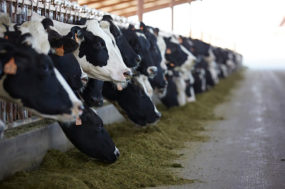Genetic gains in the Canadian dairy industry have been advancing at an unprecedented rate since the introduction of genomics in August 2009, when the first genomic evaluations were published in Canada. In the five-year period between 2014 and 2019, the average rate of genetic gain more than doubled. Two research projects funded under the Dairy Research Cluster 3 [Agriculture and Agri-Food Canada and Lactanet (DairyGen Council)] will make considerable contributions to optimizing breeding strategies and maximizing genetic gains to benefit the dairy sector.
Project 1: Understanding the impact of cutting-edge genomic technologies on breeding strategies for optimum genetic progress in Canadian dairy cattle
Researcher Christine Baes of the University of Guelph is leading this project focused on the analysis and comparison of breeding strategies and novel tools from an economic and genetic improvement perspective to increase progress in Canadian dairy cattle breeding programs. Ultimately, the outcomes will serve to help dairy farmers make more informed decisions about using new technologies, methods and breeding strategies on their farms.
In some of the work done to date, the researchers appraised and described in detail the current breeding structure and are investigating the impact of either continuing with the current structure or incorporating new technologies and traits to optimize dairy cattle breeding programs. A list of 70 traits in use in Canada was prepared, and the costs of collecting records on animals were calculated and estimates made of the genetic parameters of all measured traits. A large dataset of more than 4 million breeding records was used to investigate the use of reproductive technologies in Canadian herds and describe breeding practices.
Recommendations on how to best incorporate prospective new technologies and novel traits to optimize Canadian dairy cattle breeding programs will be developed, as well as considerations for adoption to help fully understand the long-term effects of altering the current breeding scheme.
Project overview
Principal investigator: Christine Baes (University of Guelph)
Co-investigators: Flavio Schenkel, Getu Hailu, Angela Cánovas (University of Guelph)
Period: 2018-23
Total budget: $908,723
Project 2: Accelerating genetic gain for novel traits in Canadian Holstein cows
Previous research has demonstrated that the accuracy of genomic evaluations for novel traits can be improved by increasing the size of the reference population in a cost-effective manner by genotyping cows that already have phenotypes for novel traits. In this new project, researcher Flavio S. Schenkel of the University of Guelph and his team are investigating ways to establish a much larger reference population of genotyped females to maximize the genetic progress for novel traits such as mastitis, metabolic diseases, fertility disorders, hoof health, feed efficiency and methane emissions.
The researchers are aiming to genotype some 25,000 cows from commercial herds that are collecting relevant phenotypes to increase the size and diversity of the current reference population used in genomic selection. The enlarged reference population will be used to determine genetic parameters, develop or improve genomic evaluations and deliver more accurate genomic predictions for a series of novel traits.
A larger female reference population of genotyped cows from herds recording novel traits of interest will support and increase the accuracy of routine genomic evaluations for a portfolio of traits and accelerate genomic gains, leading to the ability to breed more disease-resistant and efficient animals.
Project overview
Principal investigator: Flavio Schenkel (University of Guelph)
Co-investigators: Christine Baes, Angela Cánovas, Janusz Jamrozik (University of Guelph)
Collaborators: Xin Zhao (McGill University), Ronaldo Cerri (University of British Columbia), Stephen LeBlanc, Eduardo Ribeiro, Filippo Miglior (University of Guelph)
Period: 2018-22
Total budget: $999,922
For a summary of each project, visit the Our Research section in Dairy Research.
Dairy Farmers of Canada (DFC) invests in research to stimulate productivity, sustainability and profitability on farms and to improve knowledge on milk and dairy products’ health benefits. DFC finances research initiatives that benefit all dairy farmers across Canada and works in collaboration with its members and other sectorial partners to address farmers’ priorities set in the dairy research and knowledge translation, and transfer national strategies. Visit Dairy Research for more information.








